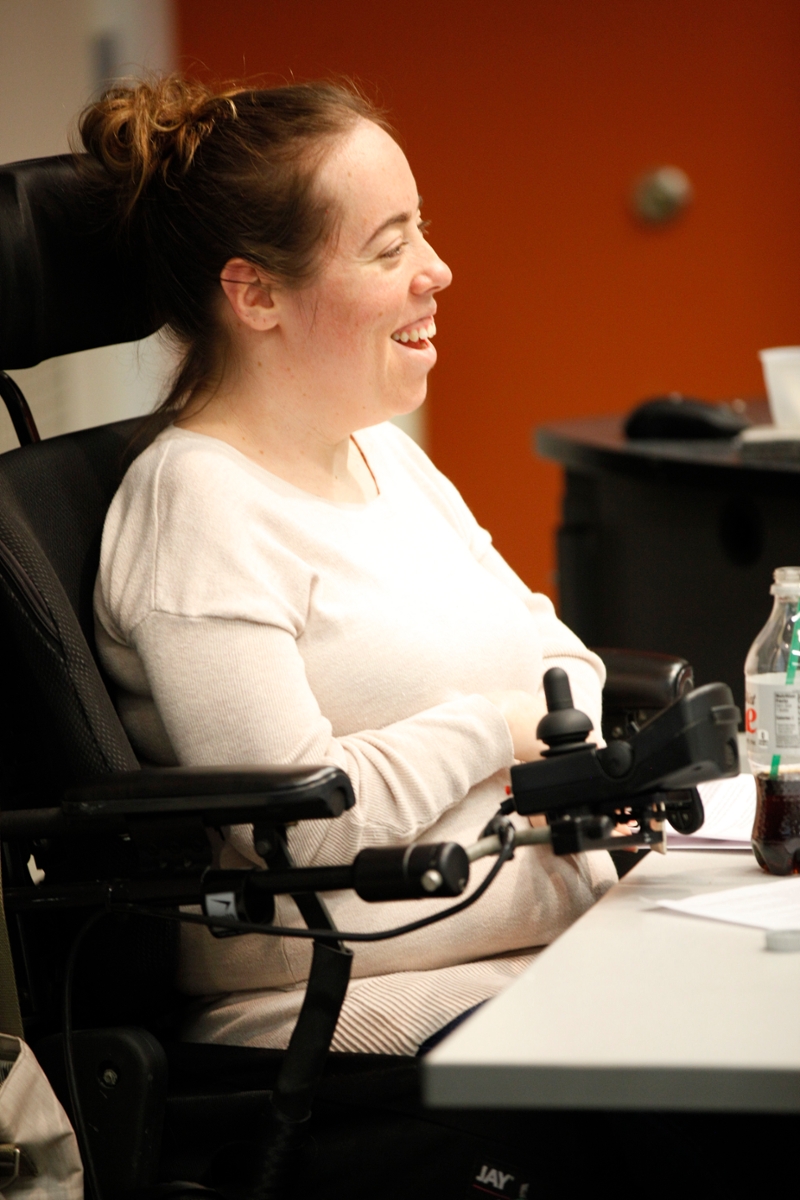Robyn Powell, a second-year PhD student in the children, youth and families concentration, has received the Paul G. Hearne Leadership Award from the American Association of People with Disabilities (AAPD), which "recognizes outstanding emerging leaders with disabilities who exemplify leadership, advocacy, and dedication to the broader cross-disability community." This prestigious award provides to its recipients a $2,500 prize and $7,500 for an initiative that seeks to increase the power of people with disabilities. Powell received this prize in recognition of her work as cofounder and team leader of the Disabled Parenting Project, an online community for parents and prospective parents with disabilities. Heller Communications spoke with Powell about the award, the Disabled Parenting Project, and her plans going forward.

Congratulations on this achievement. Please, tell us about the Disabled Parenting Project (DPP). How and when was DPP founded, and what is its mission?
The Disabled Parenting Project was founded by myself, along with Drs. Erin Andrews and Kara Ayers, in May 2015 thanks to SPARK funding. The overall mission of the DPP is to leverage technology to create opportunities for parents with disabilities to interact and use social media to share information relevant to the disabled parenting community. Moreover, we intend to use the data collected from this project to inform social policy through scholarly research, fact sheets and training resources created by and for the community. We hope this will set the stage for additional research and social action to address the important issues of discrimination and disparities facing parents with disabilities.
How will the Hearne Award help advance your work at the DPP?
The DPP is still in its infancy and winning the AAPD Paul G. Hearne Leadership Award will allow the DPP to continue its important work while also expanding and offering new services to the national cross-disability community. Specifically, the award will allow the DPP to maintain and update its website. Moreover, the award will allow us to continue ensuring full accessibility, something we are committed to but which is costly. Further, receiving the award will allow the DPP to expand what we offer to the disabled parent community. Specifically, with additional funding we intend to develop a number of podcasts and webinars on topics related to adaptive parenting equipment and techniques, the rights of parents with disabilities, and supports and services. Additionally, we aim to continue expanding knowledge through the publication and dissemination of training materials on parents with disabilities for child welfare agencies and service providers. Finally, the DPP will use the award to expand our outreach efforts through attendance at national disability conferences.
How does the DPP advance social justice and/or social policy?
As mentioned above, we intend to use the data collected from this project to inform social policy through the development of scholarly research, fact sheets, and training resources, as created by and for the community. We hope this will set the stage for additional research and social action to address the important issues of discrimination and disparities. We are currently conducting qualitative research on the experiences and needs of parents with disabilities and their families. The interest has been tremendous! We believe that the DPP adds significant contributions to the understanding of these families. To the best of our knowledge, our study is the first to examine these families through the lens of the cross-disability community. All researchers are proud disabled women, which we believe strengthens our research. Further, we are unaware of any similar research taking a cross-disability perspective, meaning it examines the experiences of people with different types of disability.
You are a team leader at DPP in addition to being a full-time PhD student and principal of Robyn Powell Consulting, LLC. In what ways do your dissertation research, your law consulting work and your work at DPP overlap or advance one another?
That is an excellent question! All of my work is very inter-connected and informed by my professional and personal experiences. Much of my consulting work involves training and advising attorneys and child welfare agencies on the rights and needs of parents with disabilities. I have further developed my knowledge of this groundbreaking area through my research at the Lurie Institute, where I have been engaged in studies examining the wellbeing of parents with intellectual disabilities and their families. My dissertation will further examine this subject by looking at the application of the Americans with Disabilities Act in child welfare matters involving parents with disabilities.
I'd be remiss if I didn't note that my work is undoubtedly motivated also by my personal experience as a disabled woman. Like many young girls, I always dreamt of the day I would become a mother. In fact, at one point, I said I wanted to have 12 children! However, until nearly five years ago, I did not realize the significant discrimination I would likely face. In 2011, while serving as an attorney advisor at the National Council on Disability (NCD), I was tasked with developing a comprehensive report on parents with disabilities and children. Authoring Rocking the Cradle: Ensuring the Rights of Parents with Disabilities and Their Children opened my eyes to the many injustices parents with diverse disabilities experience when exercising their fundamental right to raise families and ignited my commitment to fighting these inequities and ensuring that families led by parents with disabilities are properly supported.
